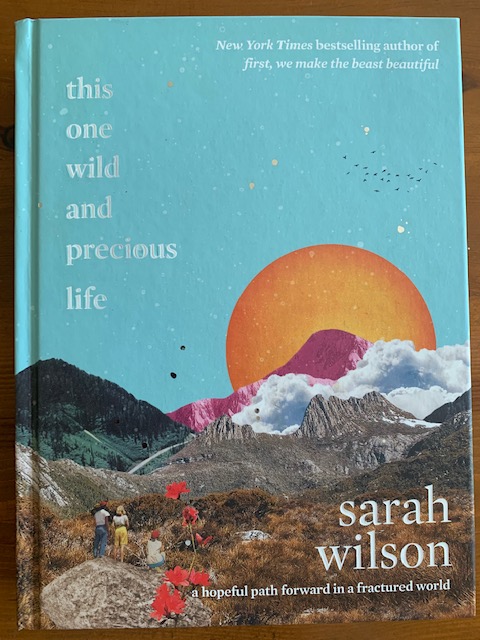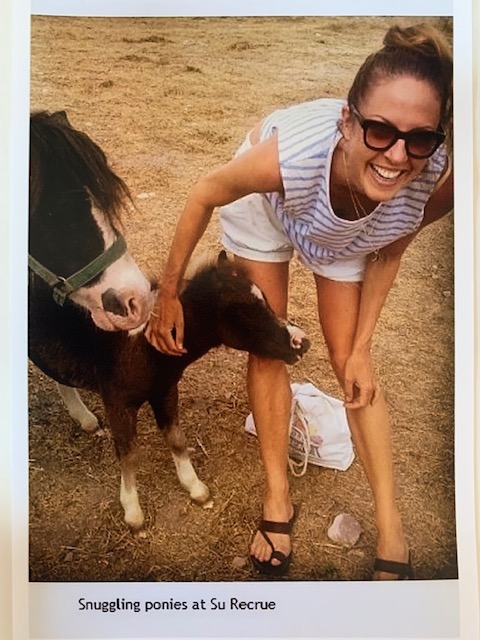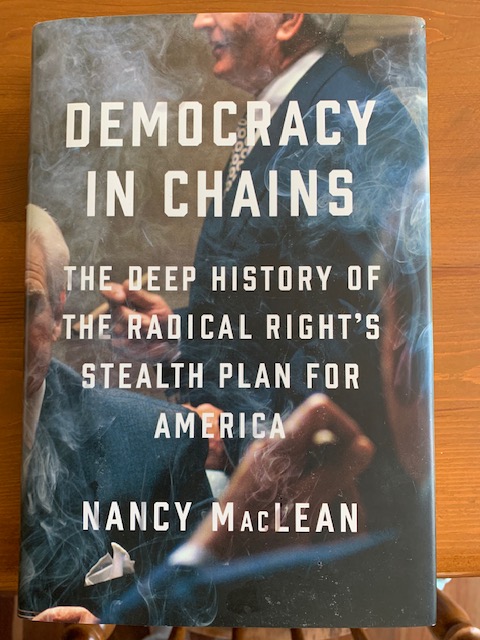An adventurous heart
 Sarah Wilson’s This One Wild and Precious Life navigates through the problems facing us all right now: coronavirus, climate change, racial inequalities, political and economic polarisation, as well as loneliness, in an accessible, thought-provoking way.
Sarah Wilson’s This One Wild and Precious Life navigates through the problems facing us all right now: coronavirus, climate change, racial inequalities, political and economic polarisation, as well as loneliness, in an accessible, thought-provoking way.
The author spent three years pondering these issues and she takes us on her travels over that time, inward and outward, as she questions and explores and tries to find a way towards some coherent answers. It all started from her observation that at the moment we are fundamentally disconnected.
‘Without meaningful connection – to others, to life, to ourselves – we also experience what sociologists and psychologists are calling “moral loneliness”, which is when the supply cord to connection, caring and doing the right thing has been severed.’
Wilson interviewed psychologists and poets, scientists and philosophers on her journey. She travelled and hiked in her quest for answers, drawing on stoicism, Jungian theory, existentialism, feminism and various spiritual practices, which, she points out, emerged in response to turbulent times like our own.
If this sounds heavy-going or ploddingly sincere and worthy, this unique book does not come across anything like that. The honesty and freshness of her writing is a joy to read, as we are welcomed into the intimate world of a remarkable person. The portraits of her in the media come across as glamorous and beautiful but she turned her back on the wealth and glamour, and her beauty is a result of her health, health that was hard-won.
 Sarah Wilson battled (and still does sometimes) with a chronic illness and some mental health issues and she has not allowed them to define her or to limit her adventurous heart. She has thought deeply and ventured widely, taking risks and achieving important things.
Sarah Wilson battled (and still does sometimes) with a chronic illness and some mental health issues and she has not allowed them to define her or to limit her adventurous heart. She has thought deeply and ventured widely, taking risks and achieving important things.
In exploring the problems outlined in her latest book, she found that ‘all roads led to the broken system we find ourselves in: Capitalism.’ She points out that a disaster (such as Covid) ‘doesn’t so much break a system as show how broken it already is’.
A kinder, more considered place
An irish poet she knows, David Whyte, suggests, when grappling with a problem or coming up against a tough question, that we ask ourselves: but what is the more beautiful question? There’s always one to be asked and it will deliver the answer we seek.
‘A question can often be laced with blame or rage. … But when we dig a few layers deeper to the more delicate, beautiful question (‘What need in me is not being met?’ ‘How can I better connect with this person?’), we find ourselves going to a kinder, more considered place in ourselves and each other,’ writes Wilson. ‘Which is what we ultimately seek, right? I mean, especially now.’
I agree with her. I think that we need to wake up. Before it’s too late we need to view our society with fresh eyes, and to do our bit to make it a better one, that is, better for the majority of us, and for the planet, instead of the status quo, which is better only for the growth of millionaires’ and billionaires’ bank balances.
Wilson critiques capitalism and its consequences but there’s something she doesn’t address. It could actually be argued that there is not enough capitalism. The basis of that ideology is competition. When there is, there are some checks and balances in place. We had that, post-war to the 1970s or a bit longer in some countries, and studies have repeatedly shown that both the poor and the rich, with much less of a gap between them, were happier then. What we’ve got now is not that, it’s the totally de-regulated Neoliberal strand of capitalism, what we’ve got now is what John Lanchester calls ‘totalitarian capitalism’. It’s the colossal transfer of wealth, much of it public assets, into a very few private hands.
Wilson’s book is about solutions
 How this came about is outlined in Nancy MacLean’s eye-watering book Democracy in Chains. (Viking, 2017) See my blog 21/1/19 here. But Wilson’s book is as much, if not more, about solutions as it is about the origins of the mess we find ourselves in. It’s a hopeful, practical, engaging book and it is the one that has endured most in my mind over the past few weeks of moving house.
How this came about is outlined in Nancy MacLean’s eye-watering book Democracy in Chains. (Viking, 2017) See my blog 21/1/19 here. But Wilson’s book is as much, if not more, about solutions as it is about the origins of the mess we find ourselves in. It’s a hopeful, practical, engaging book and it is the one that has endured most in my mind over the past few weeks of moving house.
Other books I’ve been impressed by between unpacking and organising plus not writing due to tenosynovitis (healed eventually and quickly by a myofascial release specialist) include Raynor Winn’s sequel to her The Salt Path, The Wild Silence (Michael Joseph, 2020). I explored the former in my blog of 24/2/20 here. In the latter we meet her and her husband Moth again on more adventures after that original 630 mile hike from Somerset to Dorset. The narrative gently builds in her new book, getting better as it goes along, until it reaches its profound end.
Real drama
I also loved Sue Miller’s new novel, Monogamy (Harper, 2020) about a thirty-year marriage where all was not as it seemed to one of the couple. Over the years I’ve read several of her novels and they’ve all been intriguing and insightful, utterly absorbing if you’re interested in the intricate journeys of the human heart. I’m in accord with Chekhov: ‘Real drama is soul drama.’
Then there’s the book I bought that’s not quite apt for someone with a newly acquired half-acre of garden, a book meant for those living in flats and small spaces, but in fact a useful, well written one wherever the reader happens to live: How to grow your dinner without leaving the house by Claire Ratinon (Laurence King, 2020). Growing plants gave the author delicious fresh food but also better mental and physical health. She writes: ‘… it has prompted me to cultivate an ever-expanding awareness of the systems that feed us, and to do my best to tread as lightly on our extraordinary Earth as I can.’
In this she would be in accord with Sarah Wilson, whose long journey that resulted in This One Wild and Precious Life advocates living in a way more attuned with the planet and with each other. The author allows us to see our way to a new path that is honest and sustainable, healing and creative. See sarahwilson.com for more information about this way to live.
The solutions to climate change are not all high-tech or expensive either – growing billions of trees across the world is the best and cheapest way to remove excess CO2 from the atmosphere.
Wilson is bristling with simple solutions for contemporary problems, global and personal. She advocates walking in nature, buying less – see #buylesslivemore – and doing what you can to make the world a better place. She quotes evidence that it only takes 3.5 per cent of a population to participate in sustained, non-violent protest to make change happen and to create the better world that most of us want.
She quotes many people I admire and one is the English poet Kate Tempest. Both Sarah and I urge you to read her ‘People’s Faces’ here or look her up in a You Tube performance and you’ll be breaking your heart and smiling through your tears.

Leave a Reply